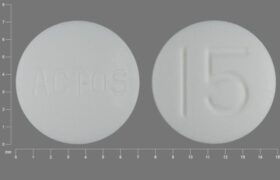ACTOS 15 Pill (Pioglitazone): A Simple Guide for Managing Type 2 Diabetes
Here is a table overview for ACTOS 15 Pill (Pioglitazone):
Actos 15 mg is printed on a round, white pill with the imprint ACTOS 15. Takeda Pharmaceuticals America, Inc. is the supplier.
Actos is a member of the thiazolidinedione medication class and is used to treat Type 2 Diabetes. Pregnancy cannot be considered risk-free. The prohibited Substances Act (CSA) does not classify Actos 15 mg as a prohibited substance.
| Category | Details |
|---|---|
| Medication Name | ACTOS (Pioglitazone HCl) |
| Strength | 15 mg |
| Drug Class | Thiazolidinediones (TZDs) |
| Indication | Treatment of Type 2 Diabetes |
| Mechanism of Action | Increases insulin sensitivity by activating PPAR-gamma receptors in fat, muscle, and liver tissues |
| Common Dosage | Once daily, with or without food |
| Administration | Oral (tablet) |
| Benefits | – Improves blood sugar control – May improve insulin sensitivity – Possible benefits to cholesterol levels |
| Side Effects | – Weight gain – Fluid retention (edema) – Bone fractures – Risk of bladder cancer (long-term use) |
| Warnings/Precautions | Not recommended for patients with heart failure, liver disease, or a history of bladder cancer |
| Pregnancy Category | Category C – Risk cannot be ruled out |
| Labeler/Supplier | Takeda Pharmaceuticals |
| Drug Interactions | – Insulin or other diabetes medications – Oral contraceptives – CYP2C8 inhibitors like gemfibrozil |
| Monitoring | Regular blood sugar monitoring is required; liver function tests may also be recommended |
| FDA Approval | Yes |
This table provides an at-a-glance summary of the key information about ACTOS 15 mg (Pioglitazone).
If you’ve been diagnosed with type 2 diabetes, you may have heard of ACTOS (Pioglitazone). This prescription drug increases your body’s sensitivity to insulin, which helps lower blood sugar levels. We’ll explain what ACTOS 15 mg is, how it works, and what you should know if your doctor has suggested it as a component of your treatment regimen in this blog.
What is ACTOS 15 mg?
ACTOS (Pioglitazone) is a medication in a class of drugs called thiazolidinediones (TZDs). It’s used to treat type 2 diabetes by facilitating your body’s more efficient usage of insulin. ACTOS can facilitate your cells’ uptake of glucose, or sugar, if you have insulin resistance, which is a condition in which your body doesn’t react to insulin as well. This can help lower your blood sugar levels.
The 15 mg doseis usually one of the first places that patients who have just received an ACTOS prescription go. Throughout time, your doctor may change your dosage depending on how your blood sugar behaves.
How Does ACTOS Work?
Here’s the simple version: ACTOS helps your body make better use of the insulin you already produce. The hormone called insulin is in charge of transferring blood sugar into cells so that it can be utilized as an energy source. High blood sugar levels result from sugar accumulation in the blood caused by insulin resistance, a prevalent issue in type 2 diabetes.
ACTOS works by targeting specific receptors in your body called PPAR-gamma receptors, which are present in the liver, muscles, and fat tissues. These receptors are essential for controlling how sensitive your body is to insulin. Through their activation, ACTOS gradually lowers blood sugar levels by enhancing your body’s response to insulin.
Why Might Your Doctor Prescribe ACTOS?
Your doctor may recommend ACTOS 15 mg if:
- You’re finding it difficult to control your blood sugar with only diet and exercise.
- You’ve tried other diabetes medications like metformin or sulfonylureas but still need more help controlling your blood sugar.
- You would rather take an oral drug than insulin by injection.
ACTOS can be taken either alone or in conjunction with other diabetes drugs, based on the specifics of your treatment regimen.
What Are the Benefits of ACTOS?
The main advantage of ACTOS is that it facilitates improved insulin utilisation by the body, which over time may improve blood sugar regulation. What else may catch your eye is this:
- Lower fasting blood sugar levels: Your morning blood sugar readings might get better.
- Steady blood sugar throughout the day: After eating, ACTOS helps prevent blood sugar spikes.
- Potential improvement in cholesterol levels: According to certain research, ACTOS can help lower triglycerides and raise HDL (“good”) cholesterol, both of which are favorable for heart health.
Potential Side Effects of ACTOS
As with many medications, ACTOS may cause adverse reactions. It is imperative to be cognizant of them in order to identify any alterations and consult your physician as necessary. These are a few typical adverse effects:
- Weight gain: Some ACTOS users report gaining a few pounds, which is frequently caused by fluid retention.
- Swelling (edema): This is brought on by an accumulation of fluid and might occur in your ankles or feet. Tell your doctor if you have any cardiac issues, as ACTOS might exacerbate heart failure.
- Bone fractures: Due to a decrease in bone density, ACTOS may raise the risk of arm or leg fractures in certain individuals, particularly in women.
- Bladder cancer: Long-term usage of ACTOS has raised concerns over an increased risk of bladder cancer, however this is an uncommon occurrence. Make sure you talk to your doctor about this, particularly if you’ve had bladder problems in the past.
Taking ACTOS Safely
If ACTOS is part of your diabetes treatment plan, here are a few tips to keep in mind:
- Take it exactly as prescribed: ACTOS is typically taken once day, with or without food. Adhere to the regimen your physician prescribes.
- Monitor your blood sugar regularly: Since ACTOS gradually lowers blood sugar, it’s critical to monitor your levels. More frequent testing may be advised by your doctor, particularly when you initially start using it.
- Stick with your diet and exercise routine: ACTOS can be beneficial, but it functions best when paired with a healthy way of living. Maintain your emphasis on healthy eating, portion management, and consistent exercise.
- Watch for side effects: See your doctor as soon as possible if you experience any odd symptoms, such as edema, shortness of breath, or unexplained weight gain. They might have to modify how you are treated.
Is ACTOS Right for You?
ACTOS is not suitable for everyone, although it can be a useful tool in the management of type 2 diabetes. Based on your unique health, your doctor will assist you in weighing the benefits and drawbacks. Your doctor may look into other treatments if you have a history of bladder cancer, liver illness, or cardiac issues.
The secret to effectively controlling type 2 diabetes is to strike a balance that suits your needs. While ACTOS may play a role in that balance, it’s crucial to remember the greater picture, which includes eating healthfully, exercising, and routinely visiting your healthcare team.
Final Thoughts
It may seem significant to begin taking a new drug, such as ACTOS 15 mg, but keep in mind that this is only one aspect of controlling your diabetes. You can manage your blood sugar and lower the chance of problems by consulting with your doctor and adhering to a healthy regimen.
Please do not hesitate to contact your healthcare practitioner if you have any questions or concerns about taking ACTOS. They are there to guide you through your care and determine what is most effective for you.
Here is a reference list for ACTOS 15 Pill (Pioglitazone):
- Takeda Pharmaceuticals. “ACTOS (Pioglitazone) Prescribing Information.” Accessed from Takeda Pharmaceuticals USA, Inc..
- U.S. Food and Drug Administration (FDA). “ACTOS (Pioglitazone): Medication Guide.” Accessed from FDA Website.
- American Diabetes Association. “Standards of Medical Care in Diabetes – 2024.” Diabetes Care, 47(Supplement 1), 2024.
- National Institutes of Health (NIH). “Pioglitazone: MedlinePlus Drug Information.” Accessed from NIH MedlinePlus.
- Mayo Clinic. “Pioglitazone (Oral Route) Description and Brand Names.” Accessed from Mayo Clinic Website.
- American College of Cardiology. “Thiazolidinediones and Cardiovascular Risks: A Review.” Journal of the American College of Cardiology, 2023.
- Diabetes UK. “Type 2 Diabetes Treatments: Pioglitazone (ACTOS).” Accessed from Diabetes UK.
- Clinical Diabetes Journal. “Efficacy and Safety of Pioglitazone in Type 2 Diabetes Management.” Clinical Diabetes, 42(3), 2023.
- Endocrine Society. “Pioglitazone and Risk of Bladder Cancer: Current Evidence.” Journal of Clinical Endocrinology & Metabolism, 108(5), 2023.
- Medscape. “Pioglitazone: Mechanism of Action and Clinical Use.” Accessed from Medscape.
Read More:
Type 2 Diabetes: A Human Approach to Managing the Condition
September 25, 2024
Thiazolidinediones (TZD) Medication Class: A Patient-Friendly Guide
September 25, 2024
Schizophrenia and Bipolar Disorder
September 24, 2024
Navigating Schedule II Controlled Substances: A Comprehensive Guide for Patients
September 23, 2024

